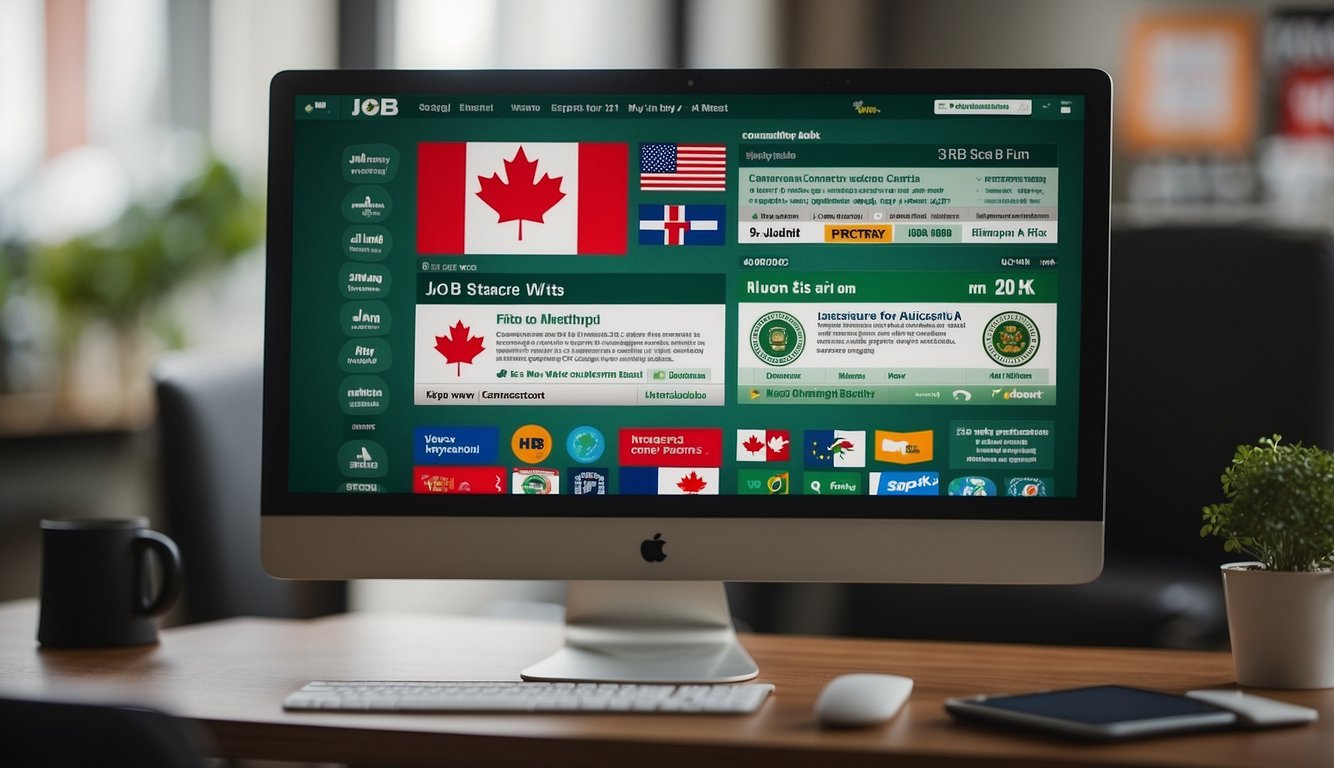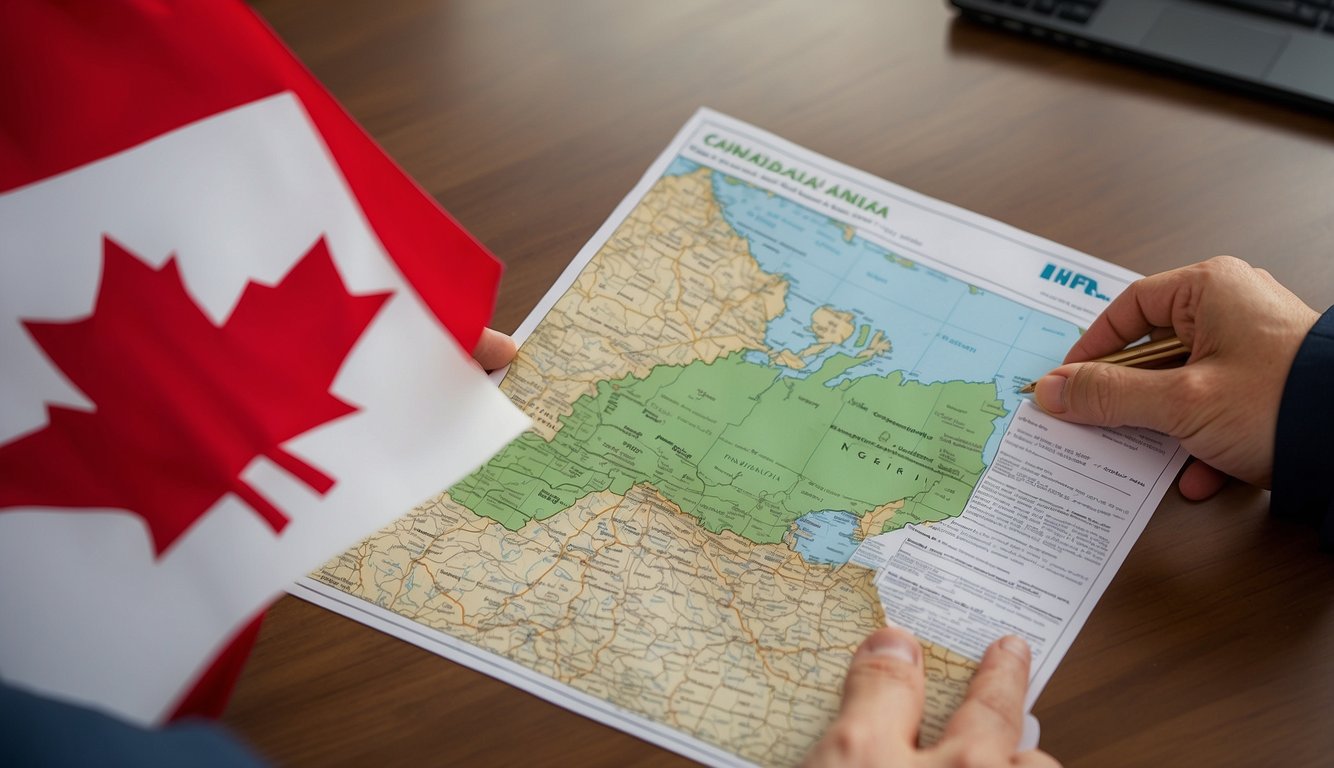Looking for a job in Canada can be a daunting task, especially when you’re coming from another country.
As a Nigerian immigrant, you may be wondering what the easiest job to get in Canada is. Fortunately, several jobs are in high demand and have a relatively low barrier to entry.
One of the easiest jobs to get in Canada from Nigeria is in the healthcare industry. With an aging population and a shortage of healthcare workers, there is a high demand for personal support workers, home healthcare aides, and other healthcare support staff.
These jobs typically require a certificate or diploma, which can be obtained through a short-term training program. Many healthcare employers are also willing to provide on-the-job training, making it easier for newcomers to get started in the industry.
Another industry with a high demand for workers in Canada is the hospitality industry. Whether you’re interested in working in a restaurant, hotel, or tourism-related business, there are plenty of opportunities available.
Many of these jobs do not require formal education or training, and employers are often willing to provide on-the-job training. However, it’s important to note that many hospitality jobs are seasonal, so you may need to be flexible in terms of your availability.
Table of contents
Canadian Immigration

If you’re looking to work in Canada from Nigeria, it’s important to understand the Canadian immigration system.
Canada has a range of immigration programs, each with its own eligibility requirements and application process.
Here are some of the main programs you should know about:
Immigration Programs and Eligibility
The federal government of Canada offers several immigration programs, including the Federal Skilled Worker Program and the Federal Skilled Trades Program.
These programs are designed to attract skilled workers to Canada and are based on a points system that evaluates candidates based on factors like education, work experience, and language proficiency.
In addition to the federal programs, each province and territory in Canada has its own Provincial Nominee Program (PNP).
These programs are designed to meet the specific needs of each province and can provide additional pathways to permanent residency for skilled workers.
Express Entry and Provincial Nominee Program
Express Entry is an online system used by the federal government to manage applications for permanent residency through the Federal Skilled Worker Program, the Federal Skilled Trades Program, and the Canadian Experience Class.
Candidates who meet the eligibility requirements can create an online profile and enter the Express Entry pool, where they are ranked based on their Comprehensive Ranking System (CRS) score. The highest-ranked candidates are invited to apply for permanent residency.
Provincial Nominee Programs (PNPs) are also linked to Express Entry. Some provinces have “enhanced” PNP streams that are aligned with Express Entry, allowing candidates to receive additional CRS points if a province nominates them.
Temporary Foreign Worker Program and International Mobility Program
The Temporary Foreign Worker Program (TFWP) allows Canadian employers to hire foreign workers to fill temporary labour shortages. This program is open to both low-skilled and high-skilled workers, but there are strict requirements that employers must meet in order to hire foreign workers.
The International Mobility Program (IMP) allows foreign workers to come to Canada for work or study without going through the traditional immigration process. This program is designed for workers who are exempt from the Labour Market Impact Assessment (LMIA) process, such as workers covered under international trade agreements.
In summary, if you’re looking to work in Canada from Nigeria, there are several immigration programs and pathways to consider.
Understanding the different programs and eligibility requirements is key to finding the easiest job to get in Canada from Nigeria.
Job Market Overview in Canada

If you are looking to work in Canada from Nigeria, it is important to have an understanding of the job market in Canada.
The Canadian economy is diverse, with a variety of industries and sectors that offer employment opportunities for people with different skills and backgrounds.
High-Demand Jobs and Sectors
There are several high-demand jobs and sectors in Canada that offer good employment opportunities.
Some of the sectors that are currently in high demand include skilled trades, technology, healthcare, agricultural, construction, and manufacturing.
These sectors are expected to continue to grow in the coming years, which means that there will be a steady demand for workers in these fields.
Understanding the TEER System
The Temporary Foreign Worker Program (TFWP) in Canada is designed to help employers meet their labour needs when there are no Canadian citizens or permanent residents available to fill job vacancies.
The TFWP is divided into two streams: the Temporary Foreign Worker Program (TFWP) and the International Mobility Program (IMP). The TFWP is based on the Labour Market Impact Assessment (LMIA) process, while the IMP is based on the International Mobility Agreement (IMA) process.
Economic Opportunities by Province
Each province in Canada has its own unique economy and job market. Some provinces have a higher demand for certain types of jobs, while others have a more diverse job market.
For example, Ontario and Quebec have a strong manufacturing sector, while British Columbia and Alberta have a strong technology sector.
It is important to research the job market in the province you are interested in working in to determine what types of jobs are in demand.
Overall, the job market in Canada offers many opportunities for people with different skills and backgrounds.
By understanding the high-demand jobs and sectors, the TEER system, and the economic opportunities by province, you can increase your chances of finding a job in Canada that is a good fit for you.
Job Search Strategies for Nigerians

If you are a Nigerian searching for the easiest job to get in Canada, there are some strategies you can use to increase your chances of finding a job.
Here are some tips to help you in your job search:
Networking and Job Resources
Networking is an essential part of job searching in Canada. You can start by reaching out to your friends, family, and acquaintances who are already living and working in Canada. They may be able to provide you with job leads or connect you with people who can help you in your job search.
Another way to network is by attending job fairs and events. These events are great opportunities to meet employers, learn about job openings, and make valuable connections.
You can also use job search websites such as Indeed, Monster, and LinkedIn to find job opportunities. These websites allow you to search for jobs by location, industry, and job title.
Tailoring Your Resume and Skills
When applying for jobs in Canada, it is crucial to tailor your resume and skills to the Canadian job market. This means highlighting your skills and work experience that are relevant to the job you are applying for.
It is also important to research the company and industry you are applying to. This will help you understand the company’s values and culture and tailor your application to fit their needs.
In addition, you may need to upgrade your skills to meet the requirements of the Canadian job market. You can do this by taking courses or obtaining certifications in your field.
By following these strategies, you can increase your chances of finding the easiest job to get in Canada from Nigeria. Good luck with your job search!
Immigration Requirements and Process

If you are a Nigerian looking for the easiest job to get in Canada, there are certain immigration requirements that you must meet.
This section will provide you with an overview of the immigration process and the requirements that you need to fulfill.
Language Proficiency and Education Assessment
One of the most important requirements for immigrating to Canada is language proficiency.
You must demonstrate that you are proficient in English or French by taking a language test, such as the International English Language Testing System (IELTS) or the Canadian English Language Proficiency Index Program (CELPIP).
Additionally, you must get your educational credentials assessed by an approved agency to ensure that they meet Canadian standards.
Work Experience and Job Offer Requirements
To be eligible for most Canadian immigration programs, you must have at least one year of work experience in a skilled occupation. You must also have a job offer from a Canadian employer.
The job offer must be for a full-time position and must meet certain requirements, such as offering a salary that meets or exceeds the prevailing wage for the occupation.
Health and Character Assessments
All immigrants to Canada are required to undergo a medical examination to ensure that they are in good health.
Additionally, you must provide a police certificate to demonstrate that you have no criminal record. These assessments are important to ensure that you are not a danger to public health or safety.
Overall, the Canadian immigration process can be complex, but by meeting the minimum requirements and following the proper procedures, you can increase your chances of success.
It is important to note that there are different immigration programs available, each with its own set of requirements.
Therefore, it is recommended that you consult with an immigration professional to determine which program is best suited to your needs.
Pathways to Canadian Permanent Residency

If you are a Nigerian immigrant looking for the easiest job to get in Canada, you may also be interested in obtaining Canadian permanent residency.
Fortunately, there are several pathways available to you.
Federal Skilled Worker and Trades Programs
The Federal Skilled Worker Program and Federal Skilled Trades Program are two popular options for individuals who have skilled work experience and want to immigrate to Canada.
The Federal Skilled Worker Program is for individuals with experience in managerial, professional, or technical/skilled trades occupations, while the Federal Skilled Trades Program is for individuals with experience in skilled manual trades occupations.
Both programs require applicants to meet specific eligibility criteria, including language proficiency and education levels, and undergo a points-based assessment.
Canadian Experience Class and Provincial Nominees
If you have already worked in Canada, you may be eligible for the Canadian Experience Class program. This program is designed for individuals who have at least one year of skilled work experience in Canada and meet other eligibility criteria.
Another option is the Provincial Nominee Program, which allows provinces and territories to nominate individuals for permanent residency based on their skills and experience in a particular province or territory.
Family Sponsorship and Humanitarian Streams
If you have a spouse, parent, or grandparent who is a Canadian permanent resident or citizen, you may be eligible for family sponsorship. This program allows eligible family members to sponsor their loved ones for permanent residency in Canada.
Additionally, there are humanitarian streams available for individuals who are refugees, protected persons, or stateless persons.
Overall, there are many pathways to Canadian permanent residency, and each one has its eligibility criteria and requirements.
It is important to thoroughly research each option and determine which one is the best fit for your individual circumstances. With the right approach and preparation, you can achieve your goal of obtaining Canadian permanent residence.
Work Permits and Temporary Residency

If you are a Nigerian looking for the easiest job to get in Canada, you will need to obtain a work permit and temporary residency first.
There are different types of work permits available in Canada, and the one you need will depend on your situation.
Open Work Permits and Employer-Specific Permits
An open work permit allows you to work for any employer in Canada, while an employer-specific permit only allows you to work for a specific employer.
To obtain an open work permit, you must meet specific eligibility criteria, such as being a spouse or common-law partner of a Canadian citizen or permanent resident, being a dependent child of a Canadian citizen or permanent resident, or being a refugee or protected person.
To obtain an employer-specific permit, you must have a job offer from a Canadian employer who has obtained a Labour Market Impact Assessment (LMIA) from Employment and Social Development Canada (ESDC).
An LMIA is a document that shows there is a need for a foreign worker to fill a job that a Canadian citizen or permanent resident cannot fill.
Post-Graduate Work Permits and Agri-Food Pilot
If you have recently graduated from a Canadian post-secondary institution, you may be eligible for a post-graduate work permit. This permit allows you to work in Canada for up to three years after you graduate.
To be eligible, you must have completed a program that is at least eight months long and have a valid study permit when you apply.
The Agri-Food Pilot is a new program that allows foreign workers to work in certain agricultural and food processing occupations in Canada. To be eligible, you must have a job offer from a designated employer and meet certain other eligibility criteria.
In conclusion, obtaining a Canadian work permit and temporary residency is necessary for Nigerian job seekers who want to work in Canada. Understanding the different types of work permits available and their eligibility criteria can help you determine which one is right for you.
Settling in Canada

Moving to a new country can be a daunting task, but with the proper preparation and mindset, you can make the transition to Canada a smooth one.
Here are some tips to help you settle in:
Adapting to Canadian Culture and Society
Canada is known for its multiculturalism, so it’s important to be open-minded and respectful of different cultures and traditions.
Learning about Canadian history, customs, and values can also help you better understand and integrate into Canadian society.
Accessing Health Care and Education
Canada has a publicly-funded healthcare system that provides basic medical services to all residents. As a newcomer, you will need to apply for a health card to access these services.
Canada also has a high-quality education system, with public schools available to all children up to the age of 18. Post-secondary education is also available at universities and colleges across the country.
Economic and Social Integration
Canada offers many economic opportunities for newcomers, with a strong job market and a high standard of living. It’s important to research the job market and understand the requirements for working in Canada.
Social integration is also important, and getting involved in community activities and events can help you meet new people and feel more connected to your new home.
Overall, settling in Canada requires adaptability, knowledge of the health care and education systems, economic opportunities, and political stability. By being prepared and open-minded, you can make the transition to Canada a successful one.
